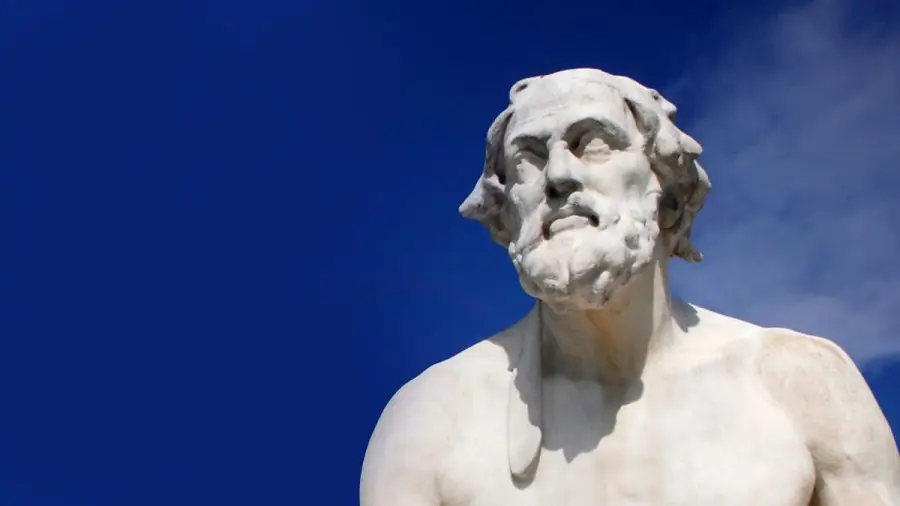In a world where history was the playground of the gods, one man chose to focus on humanity. Thucydides, an Athenian general, witnessed the devastating Peloponnesian War. He decided to write its story not as a tale of divine will, but as a study of human nature. This radical shift raises a profound question. Was Thucydides the world’s first secular historian?
Table of Contents
Secular Thucydides
To understand Thucydides’ achievement, we must first look at the world he lived in. For the ancient Greeks, gods and fate were active forces in daily life. History was often explained through divine intervention, prophecies, and supernatural signs.
Even Thucydides’ near-contemporary, Herodotus, included myths, divine motifs, and yarns in his historical narrative (p. 4). Herodotus was interested in a vast tapestry of human experience, where the divine and the human often intertwined (p. 4).
Thucydides chose a different path. He sought to create a history that was not just a story, but “a possession for all time” (p. 49). He believed this was possible only by understanding the true, underlying causes of events.
A Radical Focus on the “Human Thing”
The core of Thucydides’ secularism was his focus on human nature. He believed that mankind’s nature was constant and predictable (p. 3). Therefore, a precise understanding of a past conflict could provide invaluable lessons for the future (p. 49).
He made a clear distinction between the publicly stated reasons for the war—the “pretexts”—and the true cause. He argued the real reason for the Peloponnesian War was fundamentally human: Sparta’s fear of Athens’s growing power (p. 50). Gods had no place in this calculation. It was a cold, rational analysis of power politics.
This method was revolutionary. It dismissed divine favor or anger as explanations for victory or defeat. Instead, it pointed to political ambition, fear, self-interest, and human error.
How Thucydides Treated Religion
Thucydides did not ignore religion. He lived in a deeply religious society. He frequently mentions oracles, sacrifices, festivals, and people’s beliefs. However, he treats religion as a feature of human society, not as a force that directs it. He was interested in how belief affected human behavior (p. 14).
The Plague at Athens
His description of the great plague is a masterclass in secular analysis. He notes that prayers and supplications in temples were “equally futile” (p. 215). More importantly, he observed that the overwhelming disaster destroyed religious faith and moral codes. People saw that both the pious and the impious died alike. This led them to lose their fear of the gods and live only for immediate pleasure (p. 219). For Thucydides, religious belief was a social construct that could shatter under extreme pressure.
Oracles and Omens
When discussing prophecies, Thucydides focuses on human interpretation. He reports an old oracle that was debated during the plague. People argued whether the god had predicted limos (famine) or loimos (pestilence). They concluded it must have been pestilence, simply because that was what was happening (p. 220). This showed him that people make oracles fit their reality.
He also treats natural omens with a rational, detached eye. He describes a solar eclipse but adds a scientific observation that it occurred at the new moon, “the only time… at which it appears possible” (p. 201). This was a clear rejection of a purely superstitious interpretation (p. 14).
Religion as a Political Tool
Thucydides repeatedly shows how religion was used for political ends. The Spartans demanded that Athens drive out a religious curse. Their stated reason was piety. But Thucydides makes it clear their real goal was to slander their political rival, Pericles, who was connected to the accursed family (p. 123). Religion was a weapon in the arsenal of statesmen.
A New Standard for History
Was Thucydides the first secular historian? While other writers before him recorded past events, he was the first to systematically exclude the supernatural as a causal force. He established a new methodology for history, based on evidence, autopsy, and the cross-examination of eyewitnesses (p. 7).
He did not believe that the gods shaped events (p. 14-15). He believed that events were shaped by human nature, which was timeless. It is this unwavering focus on human causes and effects, in a world that saw gods everywhere, that makes Thucydides a revolutionary figure. The title of “first secular historian” is one he truly earned.
Summary
💡 A Break with Tradition: Thucydides consciously moved away from divine explanations for historical events, a stark contrast to his predecessors and contemporaries like Herodotus (p. 4).
💡 Human-Centered History: He believed the true causes of the war were human emotions and political realities, such as Sparta’s fear of Athenian power (p. 50). Human nature, not the will of the gods, was the constant force in his history.
💡 Religion as a Social Force: He did not ignore religion but treated it as an element of human society. He analyzed how prophecies, plagues, and piety affected human behavior and decision-making, often with disastrous results (p. 14, 219).
💡 The First Secular Historian: By consistently seeking rational causes and excluding divine agency from his analysis, Thucydides set a new standard for historiography. His work remains a powerful model of secular, evidence-based historical inquiry, solidifying his claim as the first true secular historian (p. 7, 14-15).
Works Cited
Thucydides. The Landmark Thucydides: A Comprehensive Guide to the Peloponnesian War. Edited by Robert B. Strassler, translated by Richard Crawley, Simon & Schuster, 1998.
- Costa Rica Reptiles – A Guide to Lizards, Snakes, and Crocodilians
- Costa Rica Frogs – A Guide to the Jewel-like Amphibians
- Costa Rica Wildlife – A Guide to Its Most Fascinating Mammals
- What is Alavism: Suuni or Shia?
- What Was Wittgenstein’s Main Idea: Ideas, Legacy, and Key Questions
- Shrek and Maurice Tillet: An Uncanny Connection
- The Secret to Jordan Peterson’s Debate Strategy: It’s All a Word Game
